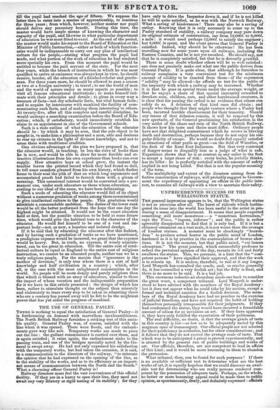THE USE OF GENERAL PASLEY.
THERE is nothing to equal the satisfaction of General Pasley—it is forthcoming on demand with marvellous inexhaustibleness. The North British Railway furnishes a striking test of this amia- ble quality. General Pasley was, of course, satisfied with the line when it was opened. There were floods, and the embank- ments gave way like salt. Tem.porary works are made to piece out the line : the gallant commissioner is carried over them, and is again satisfied ; it rains again, the embankment sinks to the passing train, and one of the bridges specially noted by the Ge- neral is swept away. He had not only expressed his satisfaction with the temporary works, but had taken the occasion, it is said, in a communication to the directors of the railway, "to reiterate the opinion that he had expressed on the opening of the line, as to the stability of the works, and as to its efficiency as an import- ant means of communication between the North and the South." What a charming officer General Pasley is
Railway directors must feel the vast convenience of this official facility. If they are in a hurry to open their line, they need not *wait any very dilatory or rigid testing of its stability ; for they
have only to drive the Inspector down it, and if he is not killed he will be quite satisfied, as he was with the Norwich Railway. What a saving of hinderances I There may also be a saving of outlay. Knowing that it is only necessary to come up to the Peale), standard of stability, a railway company may pare down its original estimate of construction, say from 12,0001. to 8,0001. a mile : it would need perhaps 12,0001. to satisfy the engineer ; but 8,0001. is spent, and the event proves that General Pasley is satisfied. Indeed, why should he be otherwise? He has been travelling now for some years upon all railways, including the Eastern Counties, and he is not yet smashed. He should say, not that he is completely satisfied, but that he is devoutly grateful. There is some doubt whether others will be so well satisfied: one does not precisely make out what use the public derives from General Pasley. It is quite clear, that although he furnishes to railway companies a very convenient test for the minimum amount of solidity to be exacted from them—if the expression " solidity" may be allowed—he affords no test for the public of the impunity with which a railway may be traversed. Whether it is that he goes in special trains under the average weight, or that he enjoys a share of that special immunity extended to drunken men, children, cats, and other harebrained creatures, it is clear that his passing the ordeal is no evidence that others can safely do so. A delusion of that kind once did obtain ; and people who thought that they might venture where a Pasley had been, incurred terrible chastisement for their temerity. Should any traces of that delusion remain, it will be removed by this new spectacle, of the General proclaiming his satisfaction in the very midst of the chaos and ruin of the North British Railway. It shows how his taste and theirs must differ. Ordinary people have not that delighted contentment which he avows in braving death and destruction, perhaps because they do not enjoy his sin- gular felicity of escape. He would no doubt feel equally satisfied in situations of other perils as great—on the field of Waterloo, or the deck of the Kent East Indiaman. But that very contempt of danger seems to disqualify him as a judge of what is safe. Experience shows that he is as content as any sailor in the fleet to accept a large share of risk : every boiler, he jovially thinks, has its billet : he is perfectly satisfied with the amount of safety implied in not being killed. But that is not the popular meaning of the term.
The multiplicity and extent of the disasters arising from de- fective construction of railways, will probably suggest to Govern- • ment the expediency of appointing an officer in the public inte- rest, to examine all railways with a view to ascertain their safety.


























 Previous page
Previous page